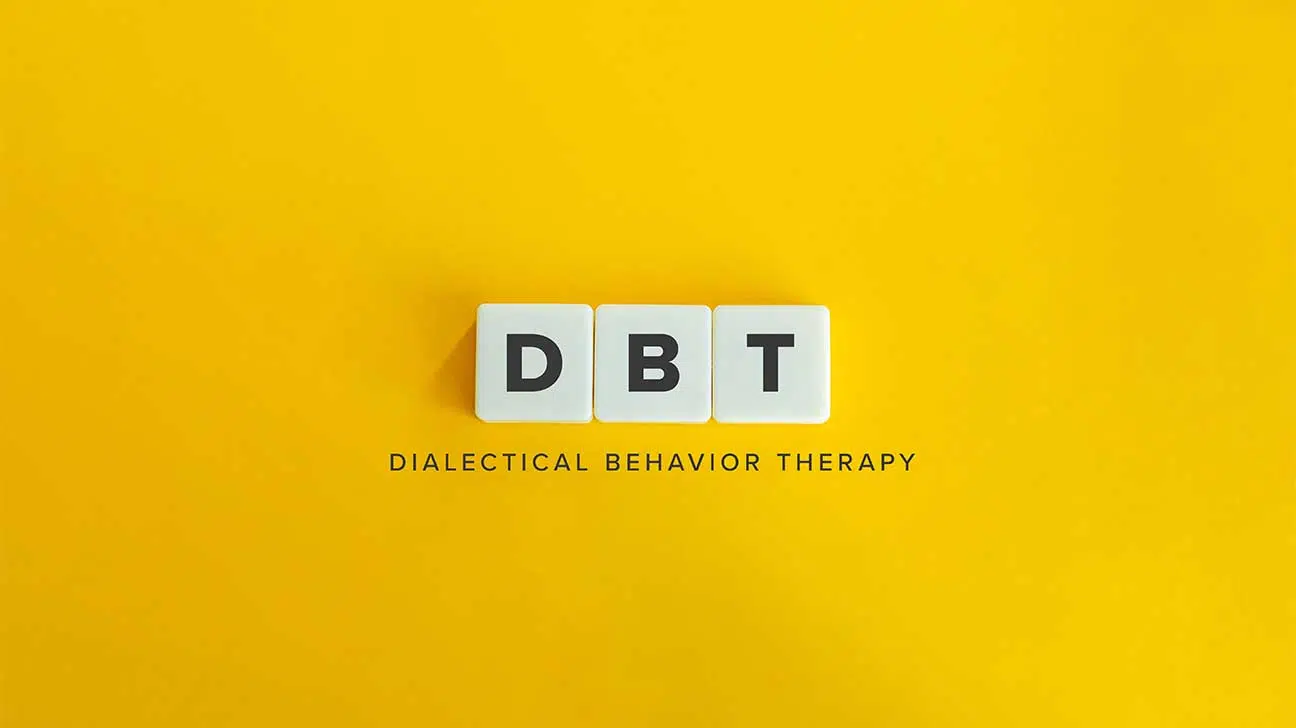Dialectical Behavior Therapy (DBT) For Substance Abuse Treatment
Dialectical behavior therapy is a multi-step therapy process that can empower people who deal with addiction. It teaches people how to cope with difficult circumstances without trying to escape or deny those circumstances.

For people who deal with substance abuse, different addiction therapy options can promote a successful recovery.
A person’s therapy should be tailored to meet their needs, and some people benefit from specific therapies more than others.
For example, many people with addictions have benefitted from dialectical behavior therapy (DBT).
This form of therapy grew out of cognitive behavioral therapy (CBT) techniques. It focuses specifically on helping clients handle stress and deal with difficult life circumstances.
Because chronic stress and trauma can contribute to addiction, having the right tools to deal with these issues can help people in their recovery.
How Does Dialectical Behavior Therapy Work?
Much like CBT, DBT uses a step-by-step therapy process, both for individuals and in group therapy settings.
During this process, the therapist and client work together to uncover stressors and establish healthy coping tools.
Mindfulness
Mindfulness is the first skill taught in DBT. With mindfulness, the patient learns how to observe the current moment.
Instead of judging the moment itself or their feelings toward it, the patient simply observes both.
Acceptance And Change
The therapist takes mindfulness a step further with the acceptance stage of DBT.
During this stage, the patient learns how to accept that the moment, as well as their thoughts and feelings about it, are happening.
However, acceptance does not mean that the person does not try to change their harmful circumstances or unhelpful thoughts. In fact, change is an important part of this step.
In this case, change comes from purposeful, thoughtful action rather than from a quick reaction.
Distress Tolerance
Because some painful situations cannot be changed or undone, DBT also shows clients how to handle these situations in a healthy way through distress tolerance skills.
For example, if a person has faced a traumatic event, they cannot erase that event. DBT teaches the addiction coping skills that they can use instead.
This stage of DBT may be especially helpful for people who deal with addiction, as some people use drugs and alcohol to self-medicate. DBT provides an alternative.
Emotional Regulation
The emotional regulation stage focuses on outward displays of intense feelings.
During this stage, the patient learns how to label their feelings, respond to them, and prepare for emotional situations in advance.
Interpersonal Effectiveness
Finally, DBT teaches interpersonal skills, helping the client relate to other people more effectively.
Clients learn how to respect themselves and others, as well as how to set and assert boundaries.
How Does Dialectical Behavior Therapy Help People With Addiction?
DBT has helped many people in recovery from addiction. Its effectiveness may come from several factors.
Team-Based Approach And Agency
Addiction can make people feel as if they have no agency. Some may feel that their addiction has complete control over their lives.
Because DBT teaches practical skills, it allows a person to regain control and assert agency in light of difficult situations.
DBT also takes a team-based approach. Instead of being passive, clients can work alongside their therapists in an active way.
Non-Avoidance
Many people use drugs and alcohol as a way to avoid difficult situations. DBT empowers clients to accept and face these situations, thus reducing the perceived need for substances.
Co-Occurring Disorders
Millions of adults with addiction also deal with a co-occurring disorder. For these adults, DBT can provide treatment for both of their mental health conditions.
DBT, which was developed for people with borderline personality disorder (BPD), has also been proven effective for depression and complex post-traumatic stress disorder (CPTSD).
People who deal with these conditions have a high risk of substance abuse disorders. DBT helps many people understand and respond to these overlapping conditions.
Find Addiction Therapy At Spring Hill Recovery Center
Receiving therapy is one of the most important steps that a person can take when dealing with addiction.
DBT and other forms of therapy allow people to increase their resilience, identify relapse triggers, and develop emotional regulation and distress tolerance skills.
Spring Hill Recovery Center uses several evidence-based therapy techniques, including DBT, to help our clients overcome addiction.
If you or a loved one need therapy for substance abuse, contact our rehab center in Andover, MA today for more information.
- National Library Of Medicine — Dialectical Behavioral Therapy https://www.ncbi.nlm.nih.gov/pmc/articles/PMC2963469/
- National Library Of Medicine — Dialectical Behavioral Therapy For Substance Abusers https://www.ncbi.nlm.nih.gov/pmc/articles/PMC2797106/
- Substance Abuse And Mental Health Services Administration — Co-Occurring Disorders And Other Health Conditions https://www.samhsa.gov/medication-assisted-treatment/medications-counseling-related-conditions/co-occurring-disorders


